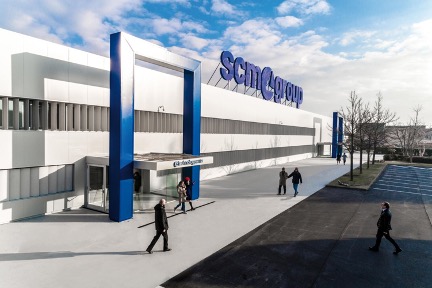ITALY – The seventieth anniversary of the Scm Group, global leader in machining technologies for an extensive range of materials and industrial components.

Over time, the Group has developed technologies and taken over leading brands not only to complete all the processes involved in secondary woodworking but also in advanced materials, plastic, glass, metal and marble.
A long success story that has resulted in today´s figures: EUR 750 million turnover in 2021 (90% exported abroad), over 4,000 employees and a direct and capillary presence around the globe. It has been led from the outset by the Aureli and Gemmani families.
The Groups history dates back to 1935, when Nicola Gemmani and Lanfranco Aureli, experts in mechanics and foundry work, started working together. In 1952, the first woodworking machine was created, L´Invincibile, designed by the engineer, Giuseppe Gemmani, Nicolas son. This machine, which in the eyes of the founders had to be special, much simpler and more practical than those already on the market, managed to meet the needs of a market in the throes of a building boom and capable of every kind of furniture.
Scm quickly created a complete range of woodworking machines that paved the way to conquering all the global markets.
In the 1960s, Adriano and Alfredo Aureli, Lanfranco's children, joined the founders. Together with Giuseppe Gemmani they led and expanded the company even further with the opening of directly controlled branches across the globe.
In 1976, Scm developed the first machining centres and systems for solid wood windows and doors. In the mid-80s, they started acquiring well-known brands in different wood-working environments, that would consolidate the companys global leadership: Mahros for automation systems (1984), Minimax for woodworking (1985) and at the end of the 80s, Gabbiani, Dmc and Morbidelli, leaders respectively in sizing, sanding and cnc panel machining centres. In 1992, the Routech brand, that marked the entry of Scm into the timber construction industry, and Stefani, an international pillar in edgebanding, were absorbed into the Group. In the years that followed, thanks to the development of other leading technologies and other acquisitions (Superfici in 2004, CPC and Sergiani in 2006, Celaschi in 2007), the Group further expanded its range to cover all the production requirements in the industry.
SCM proudly celebrates this prestigious 70-year goal of accompanying the customer through each of the processes linked to the world of panels, solid wood, timber construction and woodworking.
Luigi De Vito, Scm Division Director and Group General Manager has no doubts about their main objectives: “We aim to be even closer to our customers with highly personalised solutions, tailored to suit their specific requirements”.
In order to achieve this, Scm is investing in the skills of its global team, on the technical, sales and after sales side, and the Groups training Campus centre is playing a key role in this.
Simultaneously, the Group is upping its digital transformation process on two levels: internally, renewing organisational and international models with the customer throughout the customers journey, and at a level of the product and services offered “to be even closer to their business needs and jointly study the best strategy for smart manufacturing”.
Despite current uncertainties linked to the rising costs of raw materials and energy, Scm continues to invest even in its plants in Italy. “We are increasing the production capacity of our industrial sites that currently record an average production of 20 thousand machines per year. As well as expanding surface areas, we are carrying out modernisation work – like the work currently ongoing in Rimini – to achieve more eco-sustainable spaces congenial with our human resources. Another important driver is the digitalisation of our production lines, that sees the spread of lean processes and FCS (Factory Control System) control systems in the various plants, in line with Industry 4.0 requirements. The aim is to improve industrial organisation by enhancing integration of the factory with the IT systems”


0 Comments